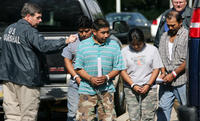-
Divisions in U.K. over Syria action
A U.S.-led attack on Syrian targets in response to the Syrian military’s use of chemical weapons in an attack on Sunni civilians last Wednesday may be delayed until next week in the face of strong opposition in the U.K. parliament to British involvement. Prime Minister David Cameron said MPs would be given a second vote to approve military action ahead of a Commons debate today (Thursday) on Syria, in order to defuse a parliamentary revolt. About seventy Tory MPs said they would join the Labor opposition in voting against the U.K. participating in the attack on Syria. Some of the opponents of U.K. participation say a UN approval of such an attack would be needed, while others say they want to see clear-cut proof of the Assad regime’s culpability.
-
-
What you haven’t heard about immigration reform and border security

The Senate and House must find a way to resolve our current immigration dilemmas. We owe a fairer, more just system of laws to all our immigrants, both illegal and legal. And, yes, we must find ways to address issues of national security as well. It’s not going to be easy to shape such legislation, but we should demand no less from both Democrats and the Republicans.
-
-
The administration does not follow its own deportation criteria

The Obama administration has set a record for deporting illegal immigrants, but the administration’s declared policy is to concentrate on criminals and other illegal immigrants who pose a risk. Yet, the administration has also been deporting immigrants who are not top priority according to the administration’s own criteria, and who may be eligible for legal residency if Congress reforms immigration law.
-
-
Federal judge: NYPD stop-and-frisk policy violates 4th, 14th Amendments (updated)

In a scathing, 195-page decision, a federal judge repudiated one of the major pillars of Mayor Michael Bloomberg’s crime-fighting strategy, finding that the NYPD’s stop-and-frisk tactics violated the constitutional rights of minorities in New York. The NYPD stopped some 4.43 million between 2004 and mid-2012, with Blacks and Hispanics accounting for 88 percent of those stopped. The NYPD has explained the disparity by saying that it mirrored the disproportionate percentage of crimes committed by young minority men. Judge Shira A. Scheindlin, using harsh language, dismissed this rationale. “This might be a valid comparison if the people stopped were criminals,” Judge Scheindlin wrote, explaining that there was significant evidence that the people being stopped were not criminals. “To the contrary, nearly 90 percent of the people stopped are released without the officer finding any basis for a summons or arrest.” Rather, Judge Scheindlin found, the city had a “policy of targeting expressly identified racial groups for stops in general.” She added: “Targeting young black and Hispanic men for stops based on the alleged criminal conduct of other young black or Hispanic men violates bedrock principles of equality.” The judge ruled that the effectiveness of “stop and frisk” was irrelevant. “Many police practices may be useful for fighting crime — preventive detention or coerced confessions, for example — but because they are unconstitutional, they cannot be used, no matter how effective,” the ruling said.
-
-
Safety engineers welcome Obama’s chemical facility safety Executive Order
The American Society of Safety Engineers (ASSE) said it supports President Obama’s Executive Order to improve federal agency coordination of U.S. chemical facility safety and security oversight. The ASSE notes that while the causes of each chemical incident are unique and require careful investigation to help ensure similar incidents do not reoccur, common to every incident are the often overlapping and sometimes confusing layers of regulatory responsibility over facilities where potentially harmful chemicals are produced or stored.
-
-
Immigration reform should consider families, social ties: study
Immigration judges should be allowed to consider a person’s family and social ties to the United States before ordering the deportation of legal permanent residents for minor offenses, says a new study. The study aso found that 98 percent of all deportees are sent to Latin America and the Caribbean even though people from those countries do not make up 98 percent of all immigrants.
-
-
DHS tentatively grants asylum to seven Mexicans
DHS has tentatively granted asylum to seven Mexican immigrants. Some of the immigrants were previously living the United States illegally, but left and tried to re-enter as part of a protest against the U.S. deportation policies, and in support of granting citizenship to immigrants who were to the United States as children.
-
-
Lawmakers criticize FDA, CDC for Cyclospora outbreak foot-dragging
Lawmakers want to know why it has taken so long for food-safety authorities to respond to the cyclospora outbreak which, so far, has sickened at least 418 people in sixteen states. They also want to know why the FDA and CDC have been tight-lipped about the specific products carrying the parasite — health authorities in Nebraska and Iowa have pointed to bagged salad containing romaine and iceberg lettuce as well as carrots and cabbage as the source – and who is the manufacturer of the contaminated products.
-
-
U.S. Appeals Court: govt. does not need search warrant to track cellphones

Law enforcement agencies have won a victory Tuesday when a federal appeals court ruled that government authorities could extract historical location data directly from telecommunications carriers without a search warrant. The ruling by the U.S. Court of Appeals for the Fifth Circuit is the first ruling directly to address the constitutionality of warrantless searches of historical location data stored by cellphone service providers. He appeals court said that historical location data is a business record which is the property of the cellphone provider. The appeals court also said that the collection of such data by authorities does not have to meet a probable cause standard as outlined under the Fourth Amendment, which protects against unlawful search and seizure and requires a search warrant.
-
-
Manning found guilty of violating the Espionage Act, acquitted of aiding the enemy (updated)

A military judge earlier this afternoon (Tuesday) found Private Manning Pfc. Bradley Manning guilty of more than twenty counts of violating the Espionage Act. The judge, Army Col. Denise Lind, found Manning not guilty of aiding the enemy. Manning admitted to being to source of the massive leaks of U.S. government documents and videos, leaks which came to be called WikiLeaks. In all, Manning has leaked more than 700,000 documents. The sentencing phase will begin Wednesday. The conviction for violating several aspects of the Espionage Act, and for stealing government property, could lead to punishment of up to 136 years in prison.
-
-
Manning found guilty of violating the Espionage Act, acquitted of aiding the enemy
A military judge earlier this afternoon (Tuesday) found Private Manning Pfc. Bradley Manning guilty of more than twenty counts of violating the Espionage Act. The judge, Army Col. Denise Lind, found Manning not guilty of aiding the enemy. Manning admitted to being to source of the massive leaks of U.S. government documents and videos, leaks which came to be called WikiLeaks. In all, Manning has leaked more than 700,000 documents. The sentencing phase will begin Wednesday. Violating several aspects of the Espionage Act could lead to punishment of up to 100 years in prison.
-
-
Court declares Hazleton, Pa. immigration ordinances unconstitutional
In 2006, the town of Hazelton, Pennsylvania, passed ordinances which denied licenses to businesses which knowingly hire undocumented workers and fined landlords who rented apartments to illegal immigrants. The ordinances have been emulated by several other states and cities since. On Friday, an appeals court declared the ordinance unconstitutional: “The ordinances disrupt a well-established federal scheme for regulating the presence and employment of immigrants in the U.S.,” Judge Munley wrote, adding that such ordinances violate the Supremacy Clause of the U.S. Constitution.
-
-
NIST seeking comments on energy industry security scenarios
The National Cybersecurity Center of Excellence (NCCoE) works with industry, academic, and government experts to create open, standards-based, modular, end-to-end solutions to cybersecurity challenges that are broadly applicable across a sector. The solutions are customizable to the needs of individual businesses, and help them more easily comply with relevant standards and regulations. The work is organized around use cases that describe sector-specific challenges.
-
-
Well water contaminants highest near natural gas drilling: study
A new study of 100 private water wells in and near the Barnett Shale showed elevated levels of potential contaminants such as arsenic and selenium closest to natural gas extraction sites. Researchers believe the increased presence of metals could be due to a variety of factors including: industrial accidents such as faulty gas well casings; mechanical vibrations from natural gas drilling activity disturbing particles in neglected water well equipment; or the lowering of water tables through drought or the removal of water used for the hydraulic fracturing process. Any of these scenarios could release dangerous compounds into shallow groundwater.
-
-
White House considering incentives for cybersecurity compliance
The Obama administration is considering whether to back tax breaks, insurance perks, and other legal benefits for companies which bolster their digital defenses. The incentives, which include limited protections from legal liability and tax incentives, would be set up to persuade power plants, water systems, chemical plants, and other critical infrastructure companies to comply with the voluntary cybersecurity rules which are being drafted as part of President Obama’s cybersecurity executive order.
-
- All
- Regional
- Water
- Biometrics
- Borders/Immig
- Business
- Cybersecurity
- Detection
- Disasters
- Government
- Infrastructure
- International
- Public health
- Public Safety
- Communication interoperabillity
- Emergency services
- Emergency medical services
- Fire
- First response
- IEDs
- Law Enforcement
- Law Enforcement Technology
- Military technology
- Nonlethal weapons
- Nuclear weapons
- Personal protection equipment
- Police
- Notification /alert systems
- Situational awareness
- Weapons systems
- Sci-Tech
- Sector Reports
- Surveillance
- Transportation
Advertising & Marketing: advertise@newswirepubs.com
Editorial: editor@newswirepubs.com
General: info@newswirepubs.com
2010-2011 © News Wire Publications, LLC News Wire Publications, LLC
220 Old Country Road | Suite 200 | Mineola | New York | 11501
Permissions and Policies
Editorial: editor@newswirepubs.com
General: info@newswirepubs.com
2010-2011 © News Wire Publications, LLC News Wire Publications, LLC
220 Old Country Road | Suite 200 | Mineola | New York | 11501
Permissions and Policies
